Veganism Can Save the World


No exaggeration! Veganism can save the world. The question is: are you brave enough to become a vegan? This is why you should give veganism some serious thought (and become at least a little more vegan and/or plant-based).
Veganism Combats World Hunger
Humans aren’t eating a lot of the food that’s grown in the world. In fact, 70% of the grain grown in the US feeds livestock, and, globally, 83% of farmland is set aside to raise animals.
It’s estimated that 700 million tons of food that humans could consume goes to livestock each year.
While meat is more calorically dense than plants, more aggregate calories (and more diverse nutrient profiles) could be produced if that land was dedicated to various plants.

Plus, all the deforestation, overfishing, and pollution caused by meat and fish industries limits the overall capacity of the Earth to produce food.
If more farmland was used to grow crops for humans, then more people could be fed at less of an expense to the planet.
This understanding is becoming more urgent as the global population is expected to hit or surpass 9.1 billion by 2050. There’s simply not enough land on the planet to raise enough meat to feed everyone the average American diet. Nor can Earth cope with the pollution this would cause.
Conserves Water
Hundreds of millions of people around the world don’t have access to clean water. Many more people struggle with periodic water scarcity, sometimes because of drought and sometimes because of mismanagement of water sources.
Livestock guzzle more freshwater than just about anything else. They’re also one of the biggest polluters of freshwater.

The more livestock the world replaces with plants, the more water there will be to go around.
It takes 100 to 200 times more water to raise a pound of beef than raising a pound of plant foods. As my colleague, Meghan, recently noted, “Cutting down on just one kilo of beef saves 15,000 liters of water. And replacing a roast chicken with a hearty veggie chili or bean stew (which has similar protein levels) saves 4,325 liters of water.”
Cleaning the Soil
Similar to how livestock pollutes water, they also erode and weaken soil. This is partly because raising livestock usually leads to deforestation, which clears huge swaths of land of the different elements (such as trees) that provide nutrients and resilience to make room for the livestock to roam.
The world loses roughly the size of Panama each year to deforestation, which also accelerates climate change (trees store carbon)
Raising a diversity of plants, instead, nourishes the soil and leads to long-term resilience.


Vegan Diets Reduces Energy Consumption
Raising livestock costs a lot of energy. This is due to a wide range of factors, including it takes a long time to raise animals; they consume food that was cultivated on land that could have been put to other use; meat products need to be shipped and refrigerated, and meat takes a long time to process from slaughterhouse to kitchen table.
Plant-based proteins, meanwhile, can be raised with 8 times fewer energy costs than meat-based proteins.

Purifies the Air
All the livestock in the world cause more air pollution than all the cars, buses, planes, ships, and other modes of transportation in the world combined.
Plants clean the air.

A Vegan Diet Will Make You More Healthy
All the nutrients you need–and probably don’t get enough of–are provided by a vegan diet. Fresh vegetables, fruits, and other vegan staples are teeming with nutrients that meat doesn’t provide.
You can get all the protein you need from peanut butter, quinoa, lentils, beans, and much, much more.
The World Health Organization released a report further outlining the increased risks of colorectal cancer from regular red meat and processed meat consumption. This is on top of existing concerns about heart disease, stroke, and other health complications.
Many people have diets that are extraordinarily high in processed food that contains added sugar, preservatives, chemicals, and other ingredients that can impede your health, make you feel sluggish daily, and lead to long-term health problems. A lot of the time, meat is at the center of this diet.
Of course, vegans can have a highly processed, unhealthy diet. But going vegan forces you to actively consider the ingredients of the foods you are consuming. This daily consideration will most likely, over time, lead to a fresher, more nutrient-rich diet.
It’s really amazing how much better you feel when you eat healthily. Try it if you don’t believe me.
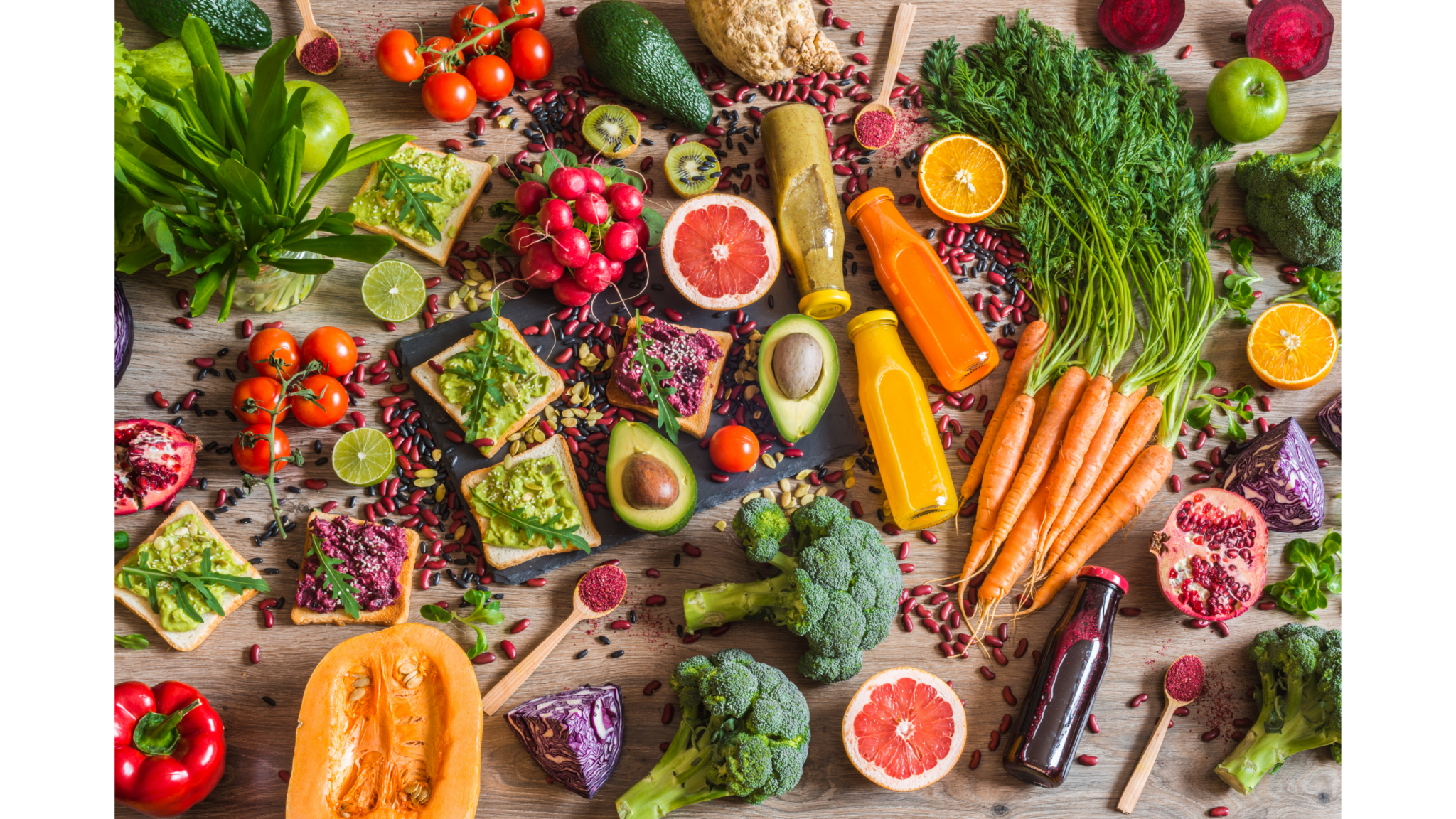
Vegan is Delicious and Not as Hard as You Think
The most common critique I’ve heard leveled against veganism is that it forces you to retire your taste buds and your free time: because meat is superior in taste and is easier to make.
While taste is subjective, and many people “need” their chicken wings on Sunday, I’d argue that the aversion to veganism is based more on cultural education than on actual comparisons.

Vegetables are delicious. They’re flavorful when cooked properly. Fruits are delicious. Walnuts, almonds, cashews, peanuts: delicious. Quinoa: delicious. Nearly all the foods in a vegan diet are super delicious, and recipes are easy to find.
It's Fun and can make you a better cook
I think everyone is guilty of some lazy cooking every now and then. And most people hit up take-out once or twice a week after a long day at work or school.
Vegetables can be a bit intimidating. There are so many of them. A lot of them have to be prepared just right. And a lot of people (myself included) didn’t grow up in environments that appreciated this (my family relied on boiling frozen vegetables).
But learning about how to access the full flavor and nutrients of a vegetable is fun and rewarding.

You’ll learn a lot about cooking methods when you have a counter full of vegetables in front of you.
It's more ethical
Come on. Animals deserve a dignified life. They’re intelligent, gentle creatures.
They shouldn’t suffer from birth to death. But that’s the life a lot of them have when born into factory farms.
Some meat producers are changing their models to adapt to the public outrage over factory farms.

I’m a vegan (but I was not always a vegan in my past), so I’m not passing judgment. Meat is at the core of a lot of diets. It plays a central role during breakfast, lunch, and dinner for many people.
It’s on the menu of nearly every restaurant. It’s everywhere in supermarkets. You can even toss a lot of meat products right into the microwave. It’s abundant, relatively cheap, and satisfying.
But it’s putting a major strain on the planet, especially as emerging middle classes worldwide are adopting Western, meat-heavy diets. And it’s unhealthy. And the meat industry is all too often unethical.
Basically, the non-vegans out there should go vegan or transition to a plant-based diet to start.
Eat Vegan, you won't regret it! Prepare this meal it's excellent and forget meats!!

Photo: The Spruce | Written by Jolinda Hackett
Ratatouille, a French eggplant and vegetable dish, is usually made vegetarian but is often served with meat. Why not make this easy vegetarian or vegan version and serve it with rice or pasta instead? You also could serve it over quinoa or any other of your favorite whole grains. If you haven’t already, give kaniwa a try.
You’ll also notice that this ratatouille recipe doesn’t call for any salt, but if you’re used to eating salted or saltier foods, you might find that you miss it and want to add it back in. Taste the finished dish first, and then just add a little bit if you find that it’s needed since all the other herbs add a great flavor without any salt at all. For best results, always use good-quality sea salt or kosher salt—the extra expense is minimal and the return in flavor is worth it.
Ratatouille makes for a great vegetarian or vegan dinner entree, no matter how you serve it up. For another serving idea, layer your vegan ratatouille on lightly toasted French bread for a vegetarian ratatouille sandwich. Try it over any of the gluten-free grains for a gluten-free vegan dinner.
Ingredients
- 1 tablespoon olive oil
- 1 large onion (diced)
- 1 bay leaf
- 4 tablespoons dry red wine
- 1/2 cup tomato juice
- 4 to 5 cloves garlic (crushed)
- 1 tablespoon dried basil
- 1 1/2 teaspoons dried marjoram
- 1 1/2 teaspoons dried oregano
- Dash ground rosemary
- 1/2 teaspoon salt
- 1/2 teaspoon black pepper
- 1 zucchini (sliced)
- 1 green bell pepper (chopped)
- 1 red bell pepper (chopped)
- 1 eggplant (cut into small cubes)
- 2 large tomatoes (cut into eighths)
- 5 tablespoons tomato paste
Steps to Make It
- Gather the ingredients.
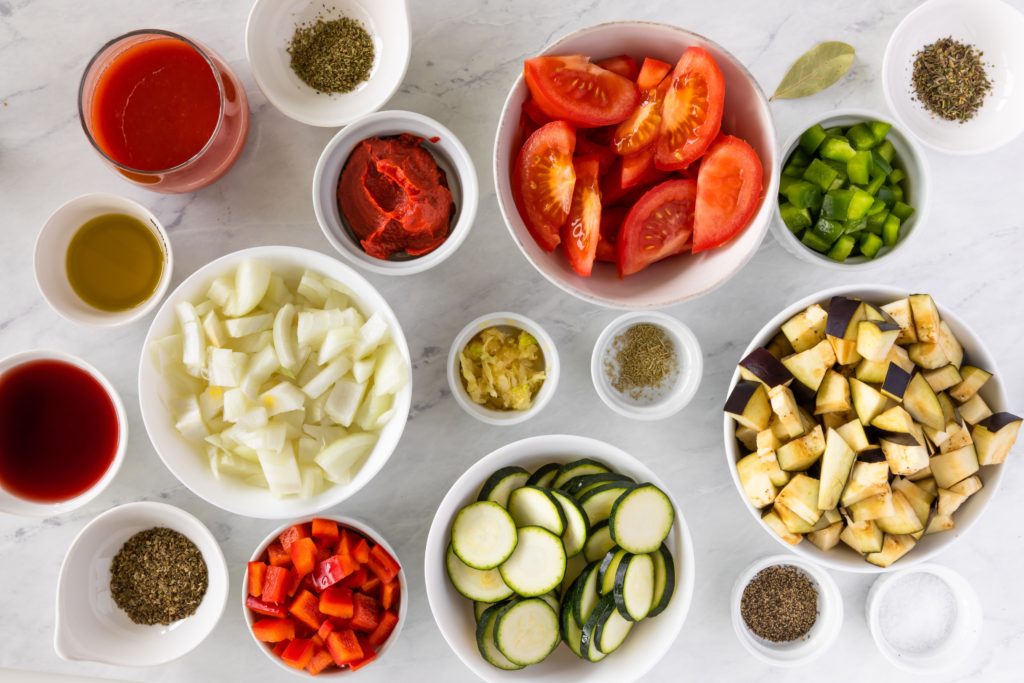
- Heat the olive oil in a large saucepan over medium heat. Saute the onion until translucent, about 5 to 7 minutes.
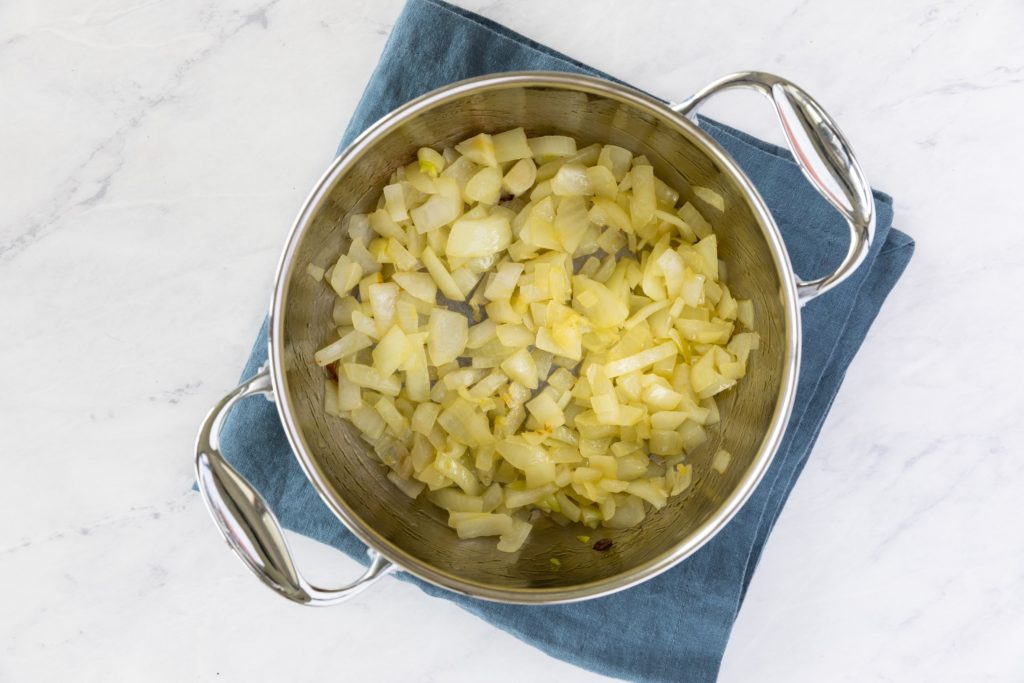
- Add the bay leaf, red wine, and tomato juice and stir to combine well.
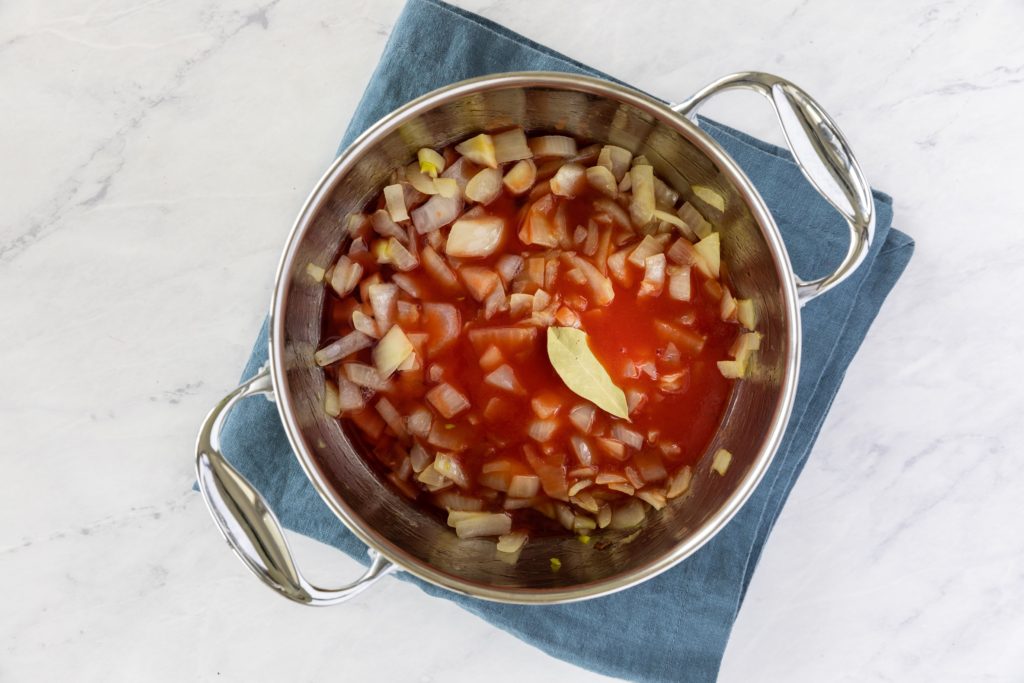
- Then add the garlic, basil, marjoram, oregano, rosemary, salt, and pepper and mix until well blended. Cover the saucepan and allow to simmer for 10 minutes over low heat.
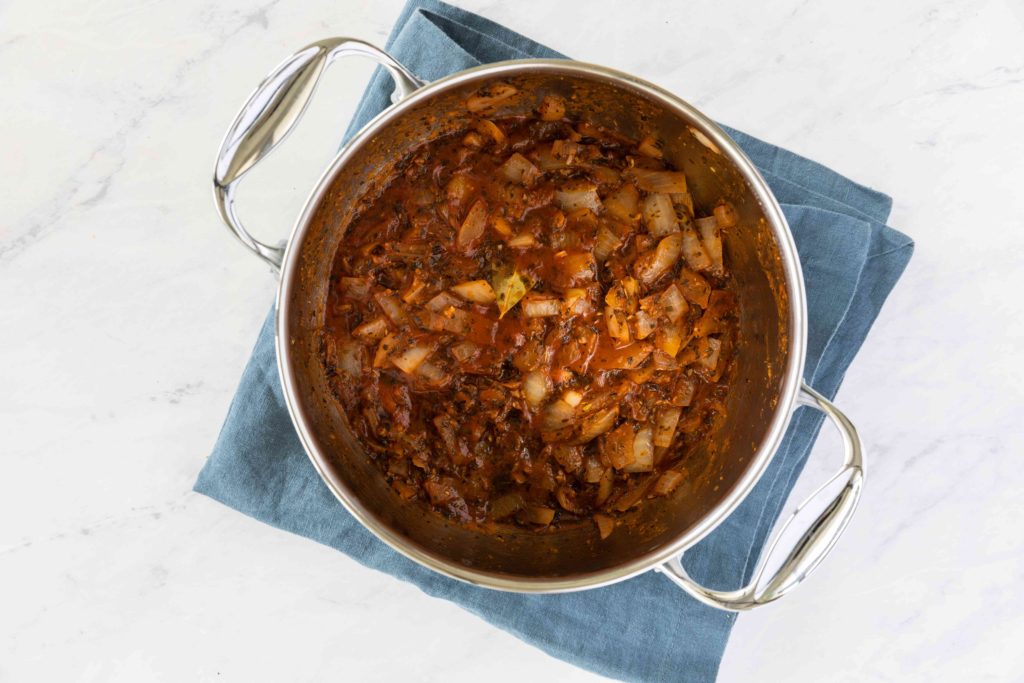
- Add the zucchini and the green and red bell peppers, stir well, cover, and simmer for another 5 minutes.
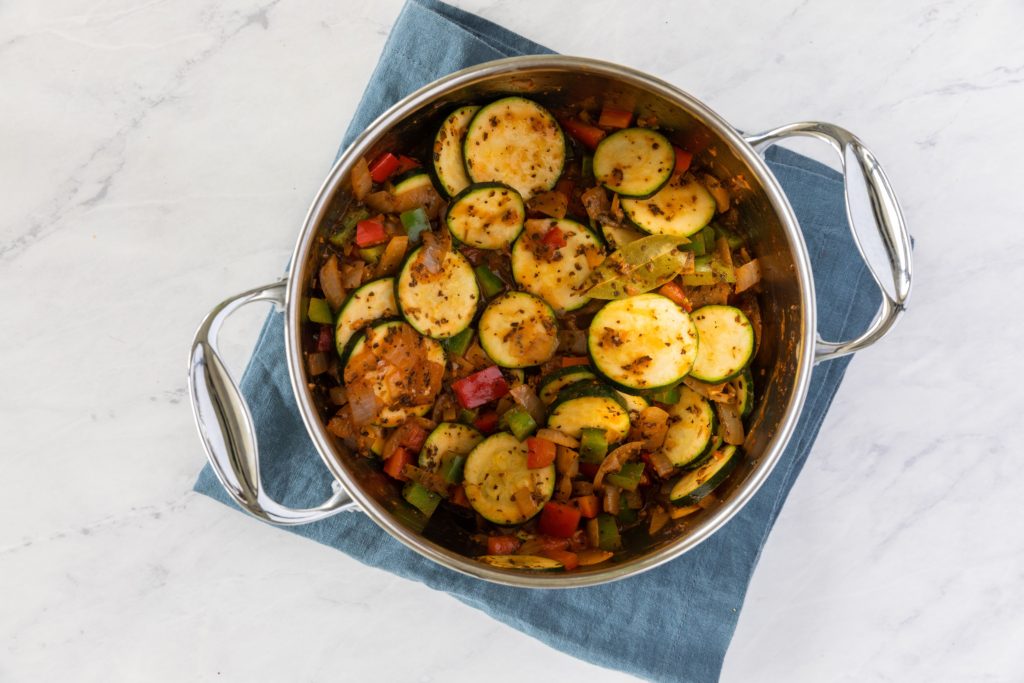
- Add the eggplant, tomatoes, and tomato paste and stir again to combine everything together well. Cover the pan and continue to simmer until the vegetables are tender, about 8 more minutes, stirring occasionally.
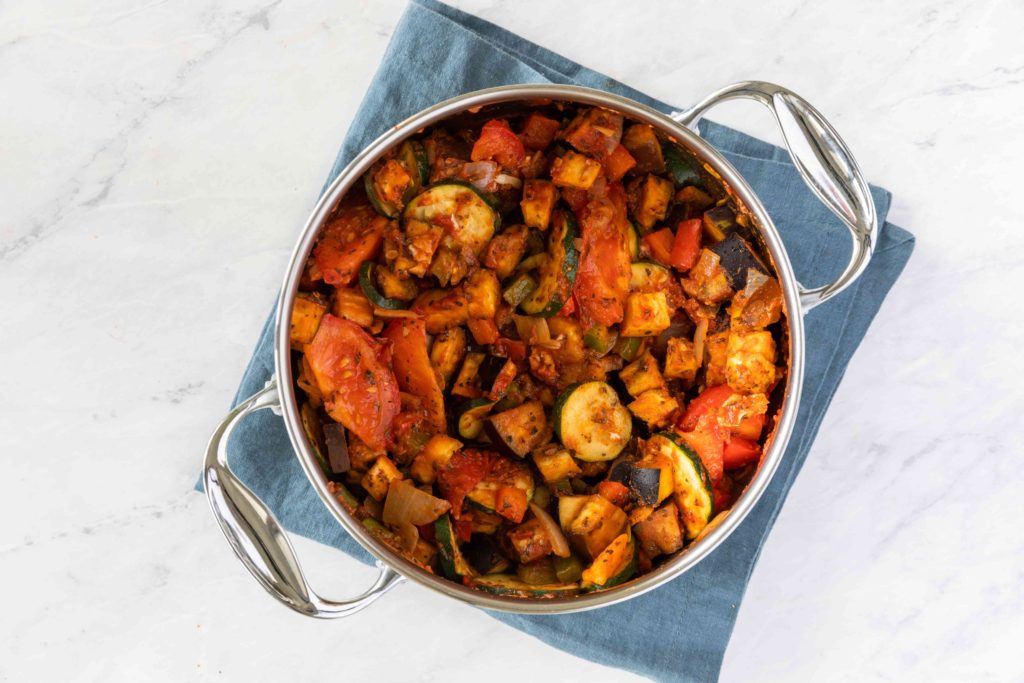
Once the veggies are tender and cooked, remove the pan from the heat immediately to make sure the vegetables don’t overcook and become soggy. Serve your vegan ratatouille over rice or pasta with French bread.
There Is No Right or Wrong When It Comes to Ratatouille
Like many other traditional cultural dishes, there are as many variations on this dish as there are chefs in France, which means that there’s really no right or wrong way to make your vegetable ratatouille. Most ratatouille recipes call for the ingredients to be sautéed stovetop first before being baked in the oven, but this basic and easy vegan version skips the oven baking step in order to keep the preparation as simple as possible for everyday weeknight meals.
This vegetarian and vegan ratatouille recipe is reprinted with permission from The Compassionate Cook Cookbook. | Photos: The Spruce Eats

